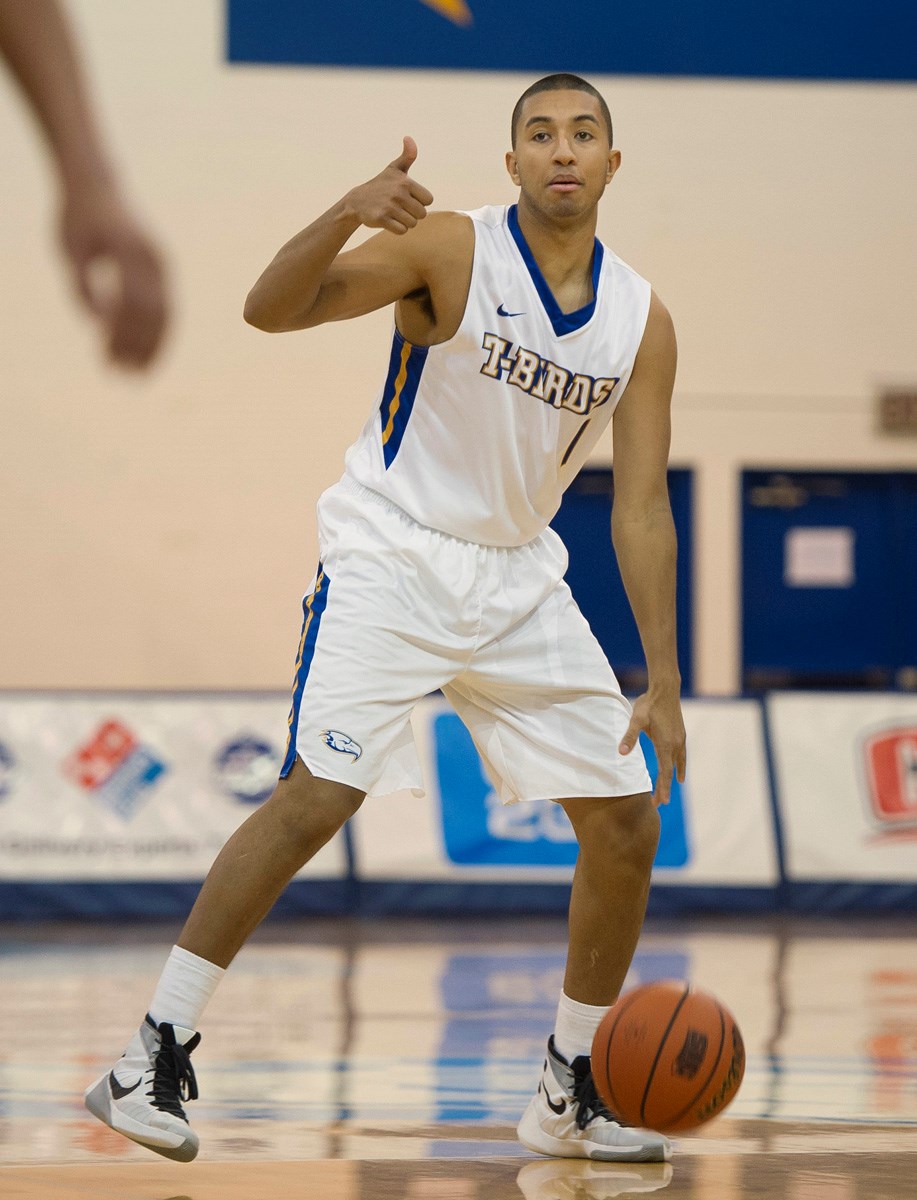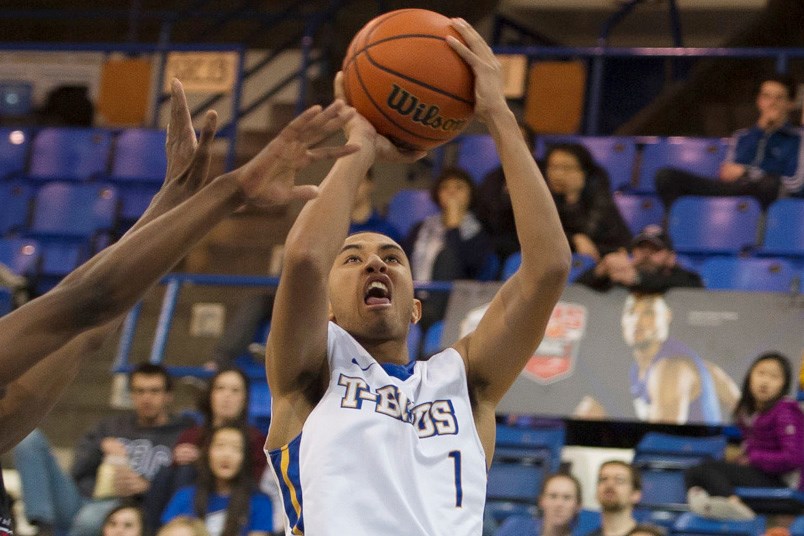When his dad put a basketball in his hands as a child, Elijah Campbell-Axson dropped it to the floor and kicked it with his foot. He played soccer. His friends all played soccer. What was a basketball if not disguised as something else to boot about?
As a toddler, he had also ignored the miniature hoop attached to his crib, but by the time he stood five-foot-nine in elementary school, a teacher sent him home with explicit instructions to join the basketball team. The tall pre-teen didn’t want his parents to sign the permission slip.
“He was all sobs,” said Campbell-Axson’s father, LaShawn.
“He doesn’t like the story, but we laugh about it all the time,” said his mom, Jocelyn. “Everyone was focused on him. Here comes the tall kid. But he is not one for attention. I think he developed a skill to be able to take the pressure off and that’s lasted and helped him on a bigger stage.”
A starter with the Fighting Irish and graduate of Vancouver College, Campbell-Axson is now a second-year guard with the UBC Thunderbirds as the university prepares to host the Canadian Interuniversity Sport collegiate championship Final 8 starting Thursday on the Point Grey campus. The tournament hasn’t been to B.C. since 1972, also the last time the T-Birds won a national title.
“It’s a once-in-a-lifetime thing to be playing in the national championship as the host team,” said Campbell-Axson. “We’re ready.”
UBC plays the No. 1 ranked Ryerson Rams at 8 p.m. Thursday at the Doug Mitchell Sports Centre. All quarterfinals will be played that night.
The T-Birds may be the underdog against the Rams, but UBC’s players are optimistic in their preparation.
“We worked for this all year round and anything can happen. All we need is three wins for the national championship and we’ve trained hard, we’ve worked hard, we have an amazing coaching staff and if everything goes well, we can beat Ryerson,” said Campbell-Axson.
Averaging less than seven minutes a game through the regular season, the six-foot role player scored two points a game and has a knack for elevating the team in other ways. Last weekend during the Canada West Playoffs, he nailed clutch threes, going three for five from outside and was perfect from the free throw line to put up 16 points and six rebounds in four games. He played 12 minutes a game.
“The contribution that I try to make all year is to be a positive teammate to be around. I’m here for any of the guys who want to come up and talk if they’re going through a rough time in school or something is not going right on the court. They can always come and talk to me,” he said. “And during the game I will be as loud as I can be on the bench, supporting the guys. If my name does get called to come into the game, I’m going to try and down a three-pointer.”
Fellow Vancouverite and one-time Kitsilano Blue Demon rival, Luka Zaharijevic remembers the Fighting Irish stand-out with sizeable afro.
“It was massive, swinging in everyone’s face and we all tease him about that one,” said the player called The Bazooka. “Now we all call him the glue of our team. Being a 12th or 13th man is always tough — we talk about it — and you have to find other ways to contribute. He is open to everyone and he has an outgoing personality.”

Zaharijevic said his teammate ribs the senior T-Birds and keeps them humble. “He loves chatting and getting into it.”
More than that, Campbell-Axson brings the sport his father loves to play under a mythological emblem of his mother’s people.
Meaningful representation
UBC has a sports emblem that does more than give the host school a nickname. The Thunderbird holds a unique place in sport as a mascot embraced by the First Nation cultures it represents and one that pays tribute to the history of the place and its people. Two of those people are Campbell-Axson and his mother, who are Musqueam.
“I believe the Thunderbird is more so a symbol of strength and a good representation of a mythological creature in the native community,” said the basketball player. “It has a lot of history behind it.”
In 1948 during half time of the homecoming football game, William Scow and his son Alf Scow endorsed the school’s use of the name Thunderbird on behalf of the Kwicksutaineuk people. In front of more than 5,000 fans, this gift was further sealed with the dedication of the 22-foot totem pole named “Victory Through Honour” that stands on campus and marks the on-going relationship as well as the traditional, unceded territory of the Musqueam.
In 1993, in a report by the Ubyssey newspaper, the younger Scow returned to UBC and then in 2004 the totem pole was re-dedicated by the Musqueam Indian Band.
It’s an example worth noting and, ideally, emulating.
Increasing criticism points to professional sports teams that have disgraced their leagues, players and fans by sticking to insulting mascots, which are racist but defended because they are also historical — if 81 years can be considered a long time on a continent where other societies speak of time immemorial.
In the NFL, there’s Washington’s regressive leadership and inexcusable epithet. In baseball there is the cartoon face of Cleveland and the chants of the Braves. In high school and college sports, some teams are named for Nations that were forcibly removed from the same land.
“Those professional teams,” said Campbell-Axson, “I believe those are very derogatory terms for First Nations people like me.”
In the UBC Thunderbirds, the relationship upholds respect, shared land and education. And this weekend, basketball.
Basketball in his roots
Truth be told, LaShawn was thrilled his son not only had the physical attributes to hold his own on the hardwood but quickly showed a natural talent, too.
A promising basketball player growing up in Tacoma, Wash., LaShawn said he was held back by his own bad attitude and indifference for the people trying to help him. He wasn’t going to let that mistake repeat itself.
“I tried to walk on to college teams but at that time I didn’t have what he has. I did have a father saying, ‘Yo, your attitude stinks.’ I did have that. That is why I’m so able to teach him the rights and wrongs of how to go about things. I spoiled my opportunity.”
He was determined to be a positive influence in his son’s life and started coaching at Immaculate Conception elementary school and still volunteers as an assistant coach with Lloyd Scrubb at Vancouver College.
“I really wanted to be a hands-on father. It didn’t matter if it was soccer or basketball or baseball. As soon as I found out I was having a son, I vowed I would be the opposite of what I had when I was brought up so I was able to change my schedule to workout out at the gym, show him how to shoot hoops and pass the ball and give him the tools he needed to be a success,” said LaShawn, who met Jocelyn on a trip to Vancouver and a few months later moved from Washington State after their friendship became more meaningful; in his words, “a beautiful thing.”
“I would have loved for my mom and step-dad to come to my games. They always had to work and I didn’t have the support system Elijah has. Back where I’m from, there was not a lot of opportunity for young African-American men there. It’s pretty bad. I took the opportunity to make a different way of life than what I was living.”
LaShawn said his son was a “devastating player” in high school who is “surrounded by love” and the support of his family. “Everybody loves this dude. I’d love to take all the credit, but it isn’t just me. I believe that if you are surrounded by love and respect, you grow up better.”
Musqueam athlete Aaron Point was an all-star basketball player for King George secondary in the mid-80s and is still in B.C.s top 20 for the 117 points he put up in four games at the 1984 provincial championships at the Agrodome. He went on to play for UBC and his single-game record of 23 rebounds still stands 29 years after the fact.
Although Musqueam’s sport of choice is not played on the hardwood, Campbell-Axson is setting an example in the community dominated at all ages by the beautiful game. Soccer is entrenched at Musqueam, but occasionally children rebound for Campbell-Axson at the community centre where he practises with his dad. From time to time, he’ll even kick around a soccer ball
“I’ll still play with friends,” he said.
“If you want to talk about soccer, there are some damn good soccer players here,” added LaShawn, who noted more children and teens are shooting hoops for their elementary and secondary schools. “I believe we reintroduced basketball to this community.”
Twitter: @MHStewart
Schedule: CIS Final 8
All games are at the UBC Doug Mitchell Sports Centre.
Quarterfinals
Thursday, March 17
1 p.m. Thompson Rivers v Carleton
3 p.m. Dalhousie v Ottawa
6 p.m. McGill v Calgary
8 p.m. UBC v Ryerson
The four losing teams play Friday, March 18 at either 5 or 7 p.m.
The four winning teams advance to the semi-finals on Saturday, March 19 with Games at 3 and 5:30 p.m.
The bronze-medal game is 2 p.m. Sunday, March 20.
The CIS men’s basketball championship game is 5:30 p.m. Sunday, March 20. The final is live on Sportsnet 360.
Correction: The last UBC Thunderbirds national men's basketball championship was 1972 not '78 as initially reported.



